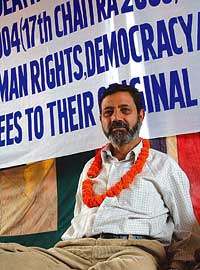 During the heydays of the Panchayat, when the state was trumpeting songs of Nepali patriotism, the most prominent Bhutani human rights leader Tek Nath Rizal was abducted from eastern Nepal at night and handed over to Bhutan to be humiliated and tortured in prison for a decade.
During the heydays of the Panchayat, when the state was trumpeting songs of Nepali patriotism, the most prominent Bhutani human rights leader Tek Nath Rizal was abducted from eastern Nepal at night and handed over to Bhutan to be humiliated and tortured in prison for a decade. The Panchayat regime has long gone, but its political hangover lingers on. Rizal had to struggle to get travel documents from the Nepali government even when many other Bhutanis have got theirs frequently from the foreign ministry. Apart from putting a few sentences about the refugee question in UN addresses, the Nepal government has done precious little to make the international community aware of a country that has evicted one-sixth of its population.
As a result, this profound humanitarian tragedy has been almost forgotten by the world. Who or what unnerves our government and bureaucracy is anybody's guess. But Rizal now has a travel permit to go around the world to drum up international support for his people's struggle. He must be a deeply worried man. As someone whom 135,000 refugees in eastern Nepal and India look up to, he understands that time is running out for a just settlement. The Bhutani government continues to distribute and redistribute confiscated farms, houses and orchards while many refugees die in the camps due to illness, malnutrition and psychological trauma of a never ending refugee life.
Considering the position taken by Bhutan and India vis-?-vis the refugee issue, Bhutani Nepalis will never get to go home unless the international community takes a strong and unambiguous position. But faced with a shortage of international allies and financial resources, Tek Nath Rizal has a daunting task ahead. Thimpu has already won the diplomatic war against Kathmandu on several fronts. The puppet regime in Thimpu has New Delhi's blessings. Bhutan portrays ethnic Nepalis as a threat to its unique culture and tradition. Many western countries and donor agencies seem unaware of their own double-standards when they buy into this racially-prejudiced argument.
Overseas Nepalis could be Tek Nath Rizal's most natural allies. But the 1.2 million strong Nepali diaspora is a largely untapped resource because most are unaware of the magnitude of the crisis and therefore aren't concerned. Some regard it as 'dirty' politics and are hesitant about getting involved. Rizal has the task of educating and convincing Nepalis abroad that it is not about politics: Bhutani refugees are not struggling to overthrow their authoritarian monarchy or pushing for multiparty democracy. They just want to go back home.
The Nepali diaspora has a moral responsibility to react and condemn the state-sponsored ethnic cleansing of people of Nepali origin in Bhutan and persuade the international communities to follow suit. The long and effective struggle for self-determination of ethnic Tamils, Sikhs, Palestinians, etc would not have been possible without a strong moral and financial support from their respective diasporas. We should do the same and extend a helping hand to our Bhutani brethren.
If what happened to Bhutani Nepalis is ignored or excused, there is no guarantee that ethnic Nepalis who have remained in Bhutan or those living in India will not be subjected to a similar fate. Tek Nath Rizal needs not only financial support but also active lobbying by overseas Nepalis in their host countries for repatriation of Bhutani refugees with dignity and honour. The time has finally come to do something more than just extend the diaspora's moral support. We can be a formidable force in shattering the shangrila myth that is present-day Bhutan.
Jugal Bhurtel is an environmental researcher based in Moscow. jugal_bhurtel@yahoo.com



